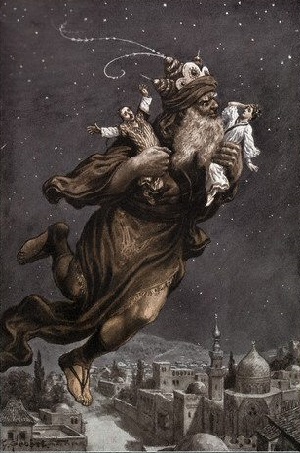
Illustration of Aladdin from Arabian Nights (c. 1900). Jinn, evil spirits in Islam, are the classic genies of folklore. The Qur’an states: “Indeed We created man from dried clay of black smooth mud. And We created the Jinn before that from the smokeless flame of fire” (Surah 15:26-27).
Islam is a religion involving both beliefs and obligations. Its beliefs include what are often called “The Five Doctrines,” while the obligations, or duties, are commonly referred to as “The Five Pillars” (more on those tomorrow).
It probably goes without saying that Islam contains numerous beliefs and practices that make up the faith. That said, however, the essence of Islam can be boiled down into five (or six) key points:
One God – Monotheism was one of the Prophet Muhammad’s most striking and divisive teachings. Although this was nothing new to the Christianity or Judaism of his day, Muhammad preached the absolute oneness of Allah in the midst of idol worshiping polytheistic peoples. Needless to say, this was the most challenging obstacle for the early Islamic message. In addition, Muhammad and early Muslims drew the line even further than the Christians, declaring that Allah, an “absolute unity,” could not “share” his deity with anything or anyone else – including a Son. This concept is known as “tawhid.” In addition, Allah is totally transcendent. Muslims believe that Allah can reveal his will or wisdom with people, but he himself can never be known personally. Again, this is in contrast to the Christian belief in God as an intimate Father and Friend, Shepherd and Savior, Comforter and Counselor.
Angels – It’s taught that each person has two angels assigned to them: one to record good deeds and another to record the bad. These “lower angels,” referred to as the Honorable Recorders (Kiraman Katibin) do not have their own free will. Archangels, however, including Gabriel (Jabril) and Michael (Mikail) appear to have been given more liberty, although they still operate totally within the will of Allah. While humans are said to be made from clay, angels are said to be made from light. In addition, another group exists within Islam as well. Jinn, or evil spirits, are believed to be made from fire. They are mortal beings and interact regularly with the human realm.
The Prophets – The Qur’an teaches that Muhammad is the “seal of the prophets” (khatam an-Nabiyyin) after a long line of Muslim messengers – over 100,000 in fact. As mentioned on Day 3, these other messengers include Adam, Noah, Moses, David, Jesus and many others. Although each prophet is believed to have brought a message from Allah needed for a particular time, each is believed to have preached essentially the same Muslim message: worship the one god, fast, pray, do pilgrimage and be charitable. Muhammad is taught to have been the final revelation of this message.
Scriptures – Although the Qur’an is believed to be the final revelation from the Muslim god, there were three revelations that came before it, each of which was mentioned in the Qur’an: the Torah (Taurat), Psalms (Zabur) and the Gospel (Injil). Although these books are thought to have been corrupted since their original writing, many Muslims still believe that much of their message is true. That said, because the Qur’an is the most recent and final of these four revelations from Allah, wherever discrepancies are found, the Qur’an prevails.
Judgement – Like Judaism and Christianity, Islam teaches that the physical death of the body is not the end of our existence. As mentioned above, Muslims believe that all of their good and bad deeds are recorded throughout their lives to be judged by Allah on the great Day of Judgement. Each soul will either be condemned to an afterlife of terrible punishment in Jahannam (hell) or one of eternal ecstasy in Jannah (paradise).
Fate – Some Muslim scholars include a “sixth doctrine,” so we’ll include that here, too. Qadar is the Muslim idea of divine predestination – or fate. This concept is taken from the Qur’an’s “decree of Allah.” It describes the belief that if Allah wills it, it is done, regardless of human will or effort. Some Muslims believe Allah exercises more of this authority over human lives than others, but all would agree that in sha Allah (if god wills) it will be done.
It goes without saying that it doesn’t matter how genuinely someone believes something to be true, or how passionately they may cling to it, or how detailed their argument may be – there is truth and there is fallacy, right and wrong, light and dark. Apart from the light of the Gospel shining into the hearts of Muslims and them coming to God by grace through faith in Jesus, they will spend eternity in hell separated from the One True God who loves them so much and made a way for them to be saved.
Please take a moment and join us in prayer:
- Pray that the same God who spoke the world into existence would speak to Muslims by His Holy Spirit. May many be freed from the doctrines of demons and gladly receive the Truth.
- Pray for a great awakening in the Muslim world. May many, who genuinely believe they are following God, be shown the way to everlasting life in true paradise.